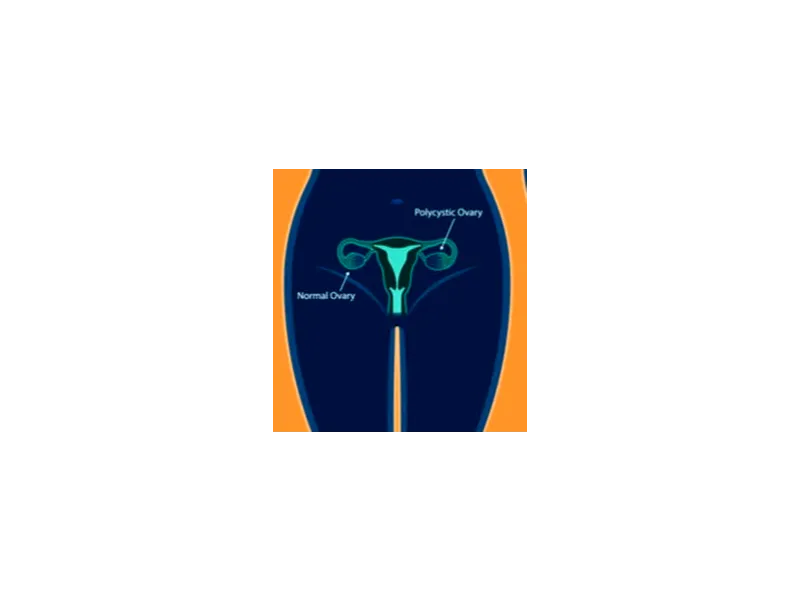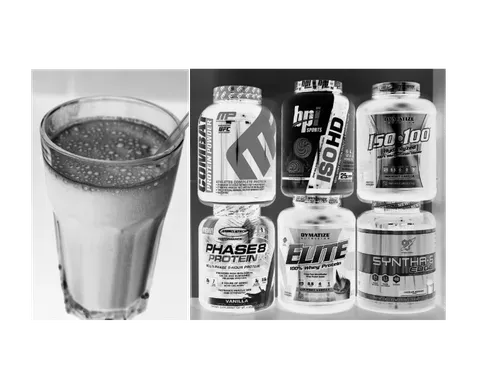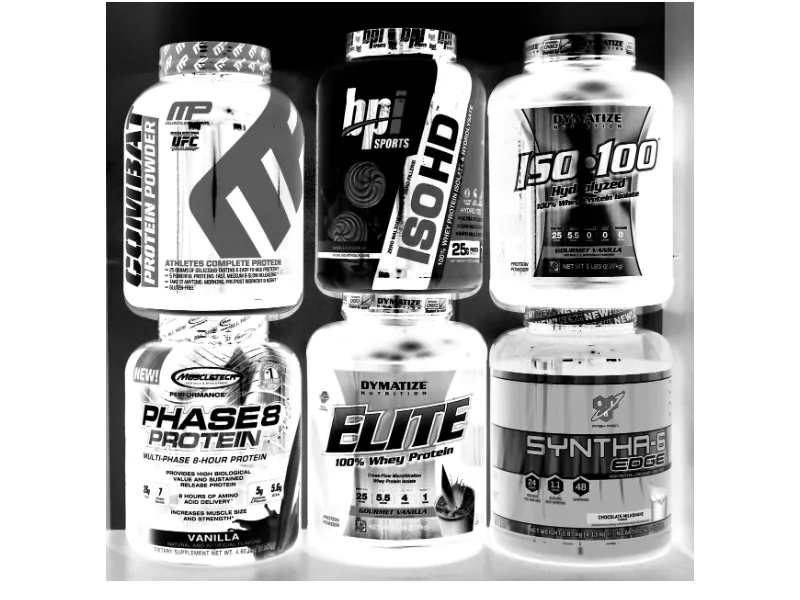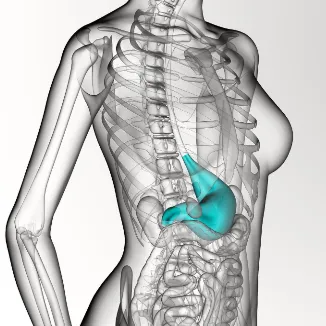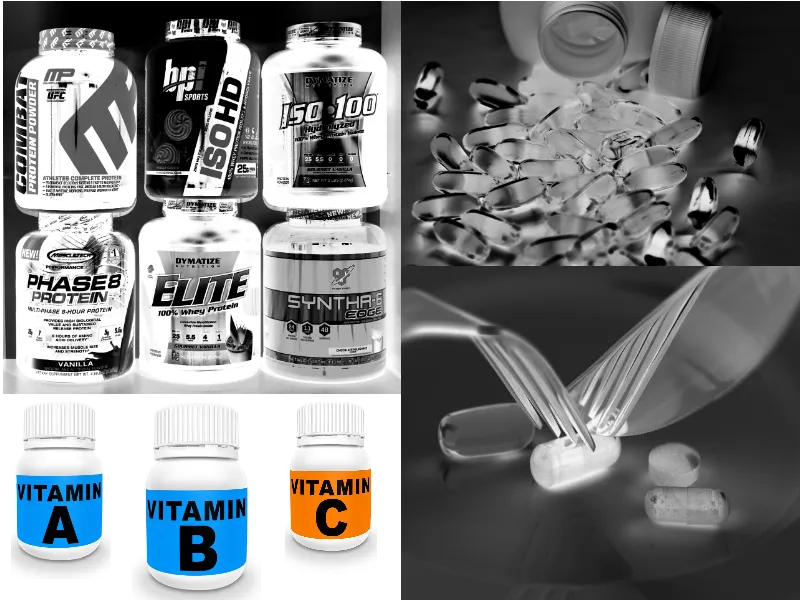Vitamins & Supplements
What Are Supplements?
Supplements are nutrient-packed products designed to be taken alongside a healthy, balanced diet. We can take them in many forms: pills, powders, drinks, and bars.
There’s no denying the fact that supplements can be an essential part of a healthy lifestyle. They can help you boost your energy levels, enhance your performance, and even reduce your risk of chronic diseases. But before you start popping supplements into your daily routine, it’s important to understand what makes a supplement work and why it’s so effective.

Supplements are defined as foods or nutrients that are added to your diet to boost your health. They are not meant to replace food or other supplements, but rather to complement them. Supplements are often used by athletes and active individuals to fill in nutritional gaps. For example, if you are deficient in iron, taking an iron supplement may help to prevent anaemia.
Here’s what we know about supplements: They provide the body with an array of vitamins, minerals and other nutrients. When taken properly, supplements are thought to boost energy levels, improve mental focus, lower cholesterol levels and even prevent cancer. You should also take a multivitamin and minerals daily. But, supplements are not regulated by the FDA and, in some cases, may cause adverse side effects.
Supplements are nutritional products that can be added to your diet to help improve your health and fitness. These products are not regulated by the FDA, but they can have benefits if used in conjunction with other supplements and a healthy lifestyle.
Supplements are vitamins, minerals, herbs, amino acids, or other substances that provide nutrients or help maintain a healthy body. Supplements come in many forms, from tablets and powders to capsules and liquids.
Supplements can be used alongside medication, are often taken on a daily basis, and some supplements are meant to prevent deficiencies that may occur as a result of normal ageing or certain diseases.
What do I need to know about the ingredients? The label on your supplement bottle will tell you what the product contains. Most manufacturers will list the name of the active ingredient, as well as any other ingredients that make up the supplement. You should also check the label for warnings or cautions about the product. If you have any concerns about the product, talk to your doctor before using it.
A quick look at the front of your bottle may tell you which vitamins or minerals are inside—but do you know the science behind them?
Supplements are a huge market in health care that few people are aware of. There are hundreds of thousands of supplements on the market today and they are designed to improve health and wellness. There are thousands of different dietary supplements on the market today.
If you are taking prescription medications, check with your pharmacist to see if there are any warnings on the bottle or if there are any cautions when using the product.
Be sure to read the label on your products carefully. Many products contain ingredients that can be harmful if you are allergic to them. If you are worried about an ingredient, ask your doctor if it is okay for you to use it.
The label will tell you if you should use this product with or without a prescription. If you do have a prescription, be sure to read the label.
Be sure to read the label on your products carefully. Many products contain ingredients that can be harmful if you are allergic to them. If you are worried about an ingredient, ask your doctor if it is okay for you to use it.
The label will tell you if you should use this product with or without a prescription. If you do have a prescription, be sure to read the label.
We asked the experts, and they gave us answers about vitamins, minerals, herbs, amino acids, and other ingredients.
Why Do We Need Supplements?

Introduction:
Supplements are the missing piece of the puzzle when it comes to building muscle, fat loss, or optimal health. As we age, our body composition changes. We’re not only losing muscle mass but also losing bone density.
As we get older, our metabolism slows down and our body becomes less efficient at producing energy. With this decline in efficiency, our bodies require more energy to perform each task. And we lose some of our ability to utilize proteins and carbohydrates efficiently.
Supplementing our diet with the right nutrients is vital to maintaining and improving our overall health and wellness. So, what exactly are supplements?
Supplements are an integral part of most people’s diets today. They are becoming more widely recognized as a natural way to improve overall health and wellbeing. But why do we need them? And what can we expect from these life-giving products?
How Should I Choose My Supplements?
If you’re like most people, you probably think that you’re getting enough vitamins and minerals in your diet. But if you’re not careful, you could be making your health worse by not taking the right supplements
You're probably taking a multivitamin every day to keep your body healthy and strong. But did you know that you can take even more of these supplements? That’s right, you can take supplements in a whole variety of forms, including pills, powders, drinks, and bars.
However, if you’ve been taking your multivitamin for years. You take it every day, and you know that it’s good for you. But lately, you’ve noticed that your body is doing strange things. Your energy levels are low, you’re having more headaches than usual, and you’re feeling stressed and anxious about life.

Are you starting to see a pattern? Maybe your body is saying that it’s time to take a step back and evaluate your vitamin intake.
Supplements are often classified by their function:
- Vitamins/Minerals Supplements - these supplements provide essential nutrients that our bodies cannot produce on its own or get from the food we eat
- Speciality Supplements - these supplements provide substances such as weight loss aids and herbal remedies.
- Herbal Supplements - these supplements give you a range of antioxidants and other nutrients for your body to use for healing and reducing stress
- Sports Nutrition
- Weight Management for those trying to slim down quickly. We can use other supplements as preventative medicine.

Some people take supplements to help with health conditions such as diabetes, arthritis and asthma control. Others take them because they can't afford recommended foods.
People take them in order to achieve their nutritional goals, but they also have side effects that people need to be aware of.
Supplement use is popular among professional athletes and active individuals, as they help to fill in the 'nutritional gaps'. With supplements becoming more prevalent in our everyday lives and with the wide variety of types on offer, it can be easy for a person to mistake one product for another.
What are the different types of supplements?
There are many different types of supplements available, including:
Sports supplements – can include protein powders, vitamins, minerals and amino acids. They are often used by people who want to build muscle, lose weight or improve their athletic performance. Sports Supplements generally include protein powders, vitamins, minerals and amino acids.
They are often used by people who want to build muscle, lose weight or improve their athletic performance.

What is the best weight loss supplement, for example?
There is no single ‘best’ weight loss supplement out there. That said, there are certain types of supplements that are more effective than others for particular reasons. Fat burning supplements
The most effective fat-burning supplements contain caffeine as well as green tea extracts. These two ingredients will help your body burn fat quicker by increasing your metabolism. Another type of fat-burning supplement is called thermogenic.
Is It Safe to Take Supplements?
Supplements are made from natural ingredients, which means that they are generally safe to take. However, some products may contain ingredients that are not suitable for everyone, or could even be harmful. Always check the label before buying a supplement.
This article aims to give you an overview of the different types of supplements, their properties and how they may benefit you. We will also look at the pros and cons of each type of supplement so that you can make an informed decision about which one is best for you.
What is The Difference Between Herbal and Non-Herbal Supplements?
When we take supplements, we’re adding vitamins, minerals, herbs, etc. to our diets. These are sometimes referred to as nutraceuticals. They are used to improve general health, treat diseases, and even fight ageing.
We can consume these in a supplement form, such as liquid drops, tablets, capsules, or powders. However, there are also a few other forms of supplementations that we may take advantage of.
The first is food supplements. They are consumed in a similar fashion to a food, but instead of using water or milk, we take a product, such as a shake, that includes ingredients that are believed to provide a nutritional boost.
Another is homoeopathic remedies. These are products, often made with natural ingredients, that are used to treat medical conditions. They work through homoeopathic principles, which are based on a theory called dilution.
Homoeopathic remedies can be ingested orally or applied topically. Another way to take advantage of these supplements is to use them as an ingredient in beauty products.
Many people use natural extracts from plants to treat their skin, hair, and nails. There are many brands out there, but they are generally considered safe for humans.
And finally, there are supplements that contain a combination of vitamins and minerals. These are often recommended to those who have a deficiency of certain vitamins and minerals.
Why you should care about supplements?
They're products made of vitamins, minerals, amino acids, proteins, hormones, herbs, enzymes, antioxidants, and other nutrients that a human body can't produce on its own. Because the body is capable of manufacturing some of these substances, the idea behind taking supplements is to increase the amount of each substance in your body, often in ways your body can't produce on its own.

There are several different types of supplements out there. They range from the ones you can simply take orally to others that have to be taken topically.
One thing they have in common is they are designed to give you a nutritional edge in one form or another. They're all manufactured to give you a nutritional advantage.
The answer is yes! They work. Take them.
Whether you are just getting started with bodybuilding or you are looking to improve endurance or reduce body fat, it's important to choose what works best for you.
They will work for you and are worth taking. What’s important to understand is that not all products will work for everyone. It depends on what your goals are. Are you trying to increase your endurance or are you trying to cut some weight?
Which supplements to choose?
Supplements are an important part of a healthful diet, and they can provide nutritional support and help maintain healthy levels of vitamins, minerals, and other essential nutrients.
But too many people don’t know the difference between supplements and natural products. There’s no difference, really. The only thing that distinguishes a supplement is its manufacturer. All supplements are natural products, but they don’t all work the same way. Most of the time, they’re designed to deliver nutrients that you can’t get from food.
If you want to be sure you’re getting the most out of your supplement intake, ask yourself these questions:
- What are the ingredients?
- Do they have the right amounts of vitamins and minerals?
- Are they safe? How do they compare with foods?
- Does the supplement contain anything that could interfere with other medications?
- Is there any evidence that it actually works?
When you look at these questions, you can see why it’s so important to use only reliable and reputable companies for your supplements. You also need to know the difference between natural products and supplements.
Natural Products vs. Supplements As you can see, natural products and supplements are very similar. They’re both made from plants, animals, or minerals. Natural products are usually sold as food, while supplements are often sold in pill form.
Natural products contain many nutrients that you can get from food, but they’re also packed with vitamins, minerals, and other nutrients.
Supplements are designed to provide additional nutrients and energy that you can’t get from food. If you’re looking for a good way to get vitamins, minerals, and other essential nutrients into your diet, you should consider natural products.
The Law behind supplements?
According to the American Dietetic Association, a supplement is a food or beverage that contains ingredients (such as vitamins and minerals) that are not naturally found in foods (such as vitamin D). Supplements are usually sold in pill, tablet, capsule, liquid, or powder form. They can also be taken through other delivery methods such as food bars, drinks, powders, or liquids.
Supplement use is common in many countries, including the United States, where some 90% of adults over the age of 12 take at least one type of supplement. The most commonly used supplements include multivitamins, calcium, iron, zinc, and vitamin D.
[1] However, the use of supplements has become controversial for a number of reasons. Some people believe that supplementation is unnecessary and may be harmful, while others feel that supplements are important for good health.
[2] The US Food and Drug Administration (FDA) defines a supplement as "a product intended to supplement the diet that contains a substance in addition to, or in place of, one or more food ingredients."
[3] In the United States, supplements are regulated by the FDA under the Dietary Supplement Health and Education Act of 1994.
[4] The act allows the FDA to regulate dietary supplements and prohibits them from being marketed as drugs.
What Are The Side Effects of Supplements?
Many people are concerned about taking supplements because they think that they will cause side effects. They also think that they will cost too much. Some people worry that they might be addicted to a certain supplement.
Others believe that the side effects might outweigh the benefits. Most of these concerns are unfounded. There are many supplements out there that don't have any side effects. In addition, many supplements have minimal side effects.
You will have to experiment with the different types of supplements until you find one that works best for you.

How to choose?
If you want to make sure that you are taking the right supplements for your needs, you're in the right place. You can find there are lots of supplements that will help you to meet all of your nutritional needs. Here's a very good place to start finding out what may be right for you.
How Do I Know if My Supplements Are Effective?
Supplements are foods that are taken by people who may be trying to gain muscle mass and lose weight. These supplements contain specific vitamins, minerals, proteins, carbohydrates, and amino acids that are essential for the growth and development of muscles.
They're also used by people who are looking to improve their cardiovascular health, increase their immune system, or control their appetite.
Supplements are important for those who are trying to get in shape and stay in shape.
In addition to providing the needed nutrients, supplements also serve another purpose. They can help to eliminate certain toxins from our bodies. These are called "detoxifiers" and are found in certain foods or herbs.
There are supplements that help to detoxify our systems, and they are often recommended to people who are dealing with serious health problems. in other words, you should be experiencing the results that made you purchase the supplements in the first place.

How Do I Know if My Supplements Are Authentic?
1. Look for a reputable logo on the label or packaging.
2. If you’re unsure, look for a reliable brand name.
3. Don’t be fooled by cheap imitation brands that look like the real thing.
4. Ask for advice at your local natural foods store.
5. Check out our post on what to do when buying supplements.
6. Read reviews and recommendations online.
7. Verify the manufacturer's website, and look at the company's certification.
8. Check with a trusted seller or manufacturer.
9. Don't take supplements from unknown sources.
10. Use the right serving size.
11. Look for a certificate of analysis (COA).
12. Visit the company’s website.
13. Check to see if the manufacturer is accredited with the United States Pharmacopoeia (USP) or National Association of Testing Laboratories (NATA).
15. Never buy supplements online or from unlicensed sellers.
16. If you can't find what you're looking for, call the company and ask for help.
17. Look for reputable certification logos, including the USPTO and FDA. Check the FDA's website and make sure the product contains what it claims to contain.
18. Avoid companies that don't allow customer questions.
19. Choose only products that contain standardised amounts of active ingredients.
20. Read the ingredient labels.
How Can I Tell if a Supplement is a Scam?
1. Does it promise instant results?
2. Does it claim to cure serious illness?
3. Does it have a list of side effects?
4. Is it marketed only to specific groups of people?
5. Has it been banned in other countries?
6. Look for a product that has been in use for over 20 years.
7. Check the ingredients. If it doesn’t have what you want, it’s probably not working.
8. Do a search for the company and see if anyone has had success with the product.
9. Read the reviews on sites like Amazon, GoodHousekeeping, and the Mayo Clinic.
10. Ask around in your local natural health store.
What Are Some Side Effects of Supplements?
1. There are few side effects to taking vitamins and supplements if you're eating a healthy diet and getting plenty of rest.
2. Some people may experience stomach upset when taking too much vitamin C or iron.
3. Taking supplements can increase the risk of kidney stones.
4. Vitamins don't have to be expensive to be effective.
5. There's no evidence that vitamin C is good for weight loss or muscle growth.
6. Supplements are most likely safe. However, some may cause digestive upset, headaches, insomnia, muscle soreness, or dehydration.
7. If you're taking prescription medication, supplementing with additional vitamins is often discouraged because many supplements contain the same active ingredients as prescription drugs.
8. While some supplements are effective, others have little to no effect on health.
9. Some products can be contaminated, causing allergic reactions, infections, or liver damage.
10. Some people experience allergic reactions to certain vitamin supplements. This includes rashes, diarrhea, and vomiting.
11. Your body doesn't absorb vitamins from food or pills as well.
12. Some supplements may interact negatively with other medications.
13. You could get vitamin B12 poisoning if you take too much.
14. It can be dangerous to take more than 100 mcg of B12 daily.
15. If you have a medical condition or take prescription drugs, check with your doctor before taking supplements.
Conclusion
In conclusion, there are many different types of supplements available on the market today. They range from those that you can just take orally to others that must be ingested through topical use. One thing they all share is that they are designed to give you a nutritional edge in one form or another. The question is, do they work? Is this stuff worth taking? That depends on your goals. Are you looking to increase endurance or are you trying to cut weight? Then what’s best for you? Read the next blog for more information.
The main advantage of supplements is that they are very easy to use. You can add them to your diet easily and can be consumed at any time. Because they are very simple to use and they are effective, they are a good choice for any individual. The other major benefit of supplements is that they are very safe and do not have any side effects. You can take them anytime and they are suitable for all ages.
However, supplements are not free from side effects. It has been reported that some supplements may cause harm to the body. Some individuals may also have allergic reactions to some supplements.
There are different types of supplements available in the market. They are sold in different forms such as powder, capsules, pills, liquids and tablets. It is very important to know the benefits of each form before taking them.
Supplements are very easy to use and are very safe. They are a good choice for any individual.
You may experience side effects such as nausea, diarrhea, and other gastrointestinal problems.
You need to understand the different types of supplements available in the market.
Different forms of supplements have different benefits. It is important to know the benefits of each form before taking them.
I hope this article has answered your question and given you some ideas to improve your own health. However, it is important that you continue to seek out information. Find out what your doctor knows about supplements. Ask him or her what he thinks is safe and what he recommends you take.

What To Do Now! Check out my list of top 5 supplements.
We are always looking to improve the lives of our customers and make sure they are healthy and well, but sometimes people need a little extra help, so we’re here to help. Check out my list of top 5 supplements to help you get started right now. Let me tell you, it's the fastest way to grow and repair your body.





